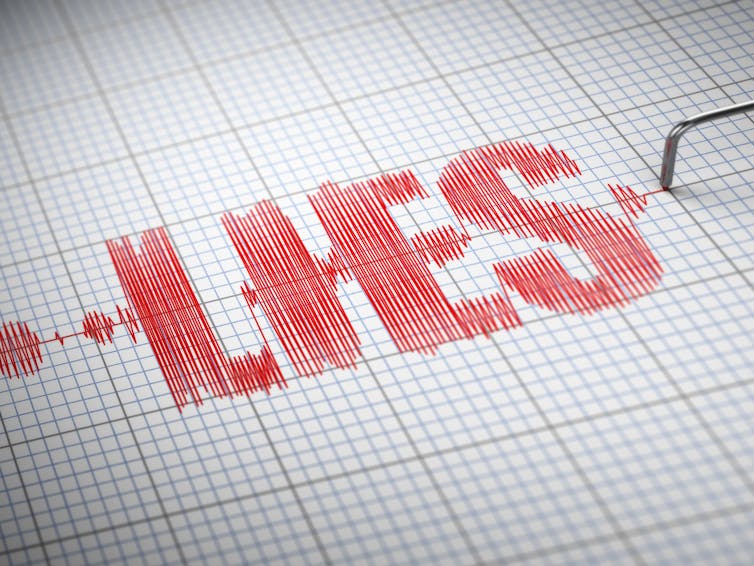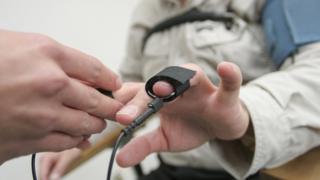Polygraph lie detector tests: can they really stop criminals reoffending? - The Conversation UK
Polygraph lie detector tests: can they really stop criminals reoffending? - The Conversation UK |
| Polygraph lie detector tests: can they really stop criminals reoffending? - The Conversation UK Posted: 24 Jan 2020 12:00 AM PST The UK government recently announced it was planning to increase the use of polygraphs to monitor offenders on probation, specifically those convicted of terrorist offences. This is one of several new measures to prevent a repeat of the recent London Bridge attack, which was committed by an offender out in the community on license. One difficulty with deciding which offenders can be released this way is that offenders can lie about their actions, thoughts and intentions to convince probation officers that they pose a low risk. The government hopes that an increased use of polygraphs will help identify terrorists planning to reoffend. But are polygraphs actually able to do this? Polygraphs are already in use in the UK for probation purposes. Since 2014, high-risk sex offenders have had to undergo polygraphs testing as part of their license conditions. Sex offenders are also routinely asked to undergo polygraphs in the US, but the practice is not common in other countries. Although polygraphs are sometimes known as lie detectors, they don't actually detect lies directly. Most modern polygraphs measure the interviewee's heart rate, breathing rate and sweating while they are asked yes/no questions. These questions need to be simple and refer to a concrete event that is known by the interviewer. This makes it hard to use polygraphs to ask people what they plan to do in the future, because we don't know enough to know the right questions to ask. The polygraph picks up on any changes in breathing, heart or sweat rate during the interview. These changes can happen for many reasons. Sometimes a response is caused by the stress of lying. Sometimes they are an "orienting response", people responding to something familiar or important to them. This can be helpful to show that somebody knows something that they said they didn't know ("guilty knowledge"). However, strong polygraph responses may also be due to shock or upset at the question or nervousness about the polygraph itself. Better than averageSo how accurate are polygraphs in actually detecting lies? There have been several reviews of polygraph accuracy. They suggest that polygraphs are accurate between 80% and 90% of the time. This means polygraphs are far from foolproof, but better than the average person's ability to spot lies, which research suggests they can do around 55% of the time. However, many of these polygraph studies involved people lying about clearly defined events in controlled experiments. It is possible that polygraphs are less accurate in real life probation cases. One study from 2006 attempted to estimate the accuracy of the polygraph with US sex offenders, but it relied on the offenders saying when the polygraph was wrong, which may not be entirely accurate.  Unfortunately, we don't know how often probation officers suspect that offenders are lying and how good they are at identifying lies. So, we don't know whether polygraphs are better than probation officers. There are also concerns about when the polygraph is wrong. The test can be beaten by liars with knowledge of how polygraphs work and are used. These people may also be the ones that the probation officers are most interested in catching. They may have practised how to beat polygraphs precisely because they have very serious things to hide. Some studies show that polygraphs are worse at detecting that people are telling the truth than detecting they are lying, in some cases indicating deception for almost half of the people who are actually telling the truth. This can be especially difficult to deal with in probation situations, where an offender may have no opportunity to prove that they were not lying when the polygraph indicates they are. How do you prove that you weren't planning to reoffend? Encouraging truth tellingHowever, there is another use for polygraphs in probation. They encourage people to confess. Forensic psychologist Theresa Gannon and her colleagues studied this on UK sex offenders in 2014. They found that offenders were more likely to disclose something of interest when using the polygraph (75%, instead of 51% without). This disclosure often happened after the polygraph had indicated deception. It may be that offenders feel forced to make a confession after failing the polygraph. However, the study could not tell whether these confessions are true. After failing a polygraph, offenders may feel that further denials won't be believed and confessing is best, even when they were not lying. This research suggests that the polygraph can be used to psychologically pressure offenders into disclosing self-incriminating information. Information that may not even be true. So, is it a good idea for the government to increase polygraph use to monitor offenders? Research shows that they are nowhere near foolproof, but they may have some usefulness as a potential indicator of deception and to encourage truth telling. However, using them raises several ethical questions. For example, it is fair to use them to try and extract self-incriminating statements? Some people may argue that something is better than nothing and polygraphs are the best we've got. But in instances where polygraphs are so inaccurate that they give probation officers more useless than useful information, nothing may be better than something. |
| How widely are lie detectors used in the UK? - BBC News Posted: 30 Jun 2019 12:00 AM PDT  Image copyright Getty Images Image copyright Getty Images The producers of ITV's Jeremy Kyle Show have been labelled as "irresponsible" after admitting that lie detector tests used on the show were "not 100% accurate". Speaking at a parliamentary inquiry launched after the death of a participant who failed a test on the show, the channel's chief executive Dame Carolyn McCall said they would not make any similar series involving lie detectors in the future. What are lie detectors?Lie detectors - or polygraphs - measure a number of bodily responses, such as blood pressure or sweaty palms, to detect traits associated with lying. Advocates claim that when carried out by professionals in the right conditions, the accuracy is estimated to be between 80 and 90%. But the American Psychological Association advises that people should "remain sceptical about any conclusion wrung from a polygraph". No-one claims the tests are 100% accurate, but lie detectors can be and are used in the UK. Who uses lie detector tests?The most high-profile use in the UK is by the probation service. The option to use lie detector tests on serious sex offenders on parole in England and Wales has been in place since 2007 but, since 2014, mandatory tests can be attached to an offender's release conditions. It came after Ministry of Justice research showed that sex offenders taking a test were twice as likely to admit breaching release conditions when a polygraph was used. If a sex offender fails a lie detector test, it is "not conclusive proof that the individual is lying", but it could lead to further investigation or supervision. In February 2018, the Ministry of Justice said that, since the tests had been introduced, 166 sex offenders had been returned to jail after polygraphs flagged concerns about their behaviour and had then faced further investigations. Around 50 people were being tested each month. Similar measures are currently being considered for released domestic abuse offenders in England and Wales as part of the Domestic Abuse Bill. At the beginning of the year, a former chief of UK immigration enforcement said polygraphs should also be used to spot "signs of deception" by some asylum seekers, but the Home Office rejected the idea. Probation services and police forces in Scotland and Northern Ireland currently do not use lie detectors Can lie detector results be used as evidence?Once a polygraph test is taken, the results cannot be used in the courts to prove a case in the UK, says Ian Kelcey, a criminal law solicitor. "It is not admissible in this country as evidence. Some states in America allow them, but you're never going to get it admitted here." Police can use polygraphs to assist investigations and monitor certain high-risk individuals. Currently, seven police forces in England and Wales use them with existing sex offenders and occasionally suspects, but this remains voluntary. Michelle Skeer, the National Police Chiefs' Council's lead on managing sexual offenders, said: "Work is currently ongoing to understand the benefits of polygraph within policing and whether its use could be expanded in the future. Findings from this research will be evaluated this year. "Any continued use of polygraph or its expansion will be done with due oversight." Can employers use lie detectors?Employers are allowed to offer a lie detector test to staff, but again this must always be optional. Elizabeth Maxwell, an employment law specialist, says that a lack of regulation or a universal standard makes their use uncharted territory. "An employer could use it, but it would come down to whether there are reasonable grounds for suspecting gross misconduct and ensuring a fair procedure was followed. "Polygraph results could be used [in tribunals], but are generally used to settle disputes before they reach this stage. If they do go further, it would be up to a judge to decide whether it's admissible." Refusal to do one should not be used solely as evidence of an employee's guilt, as this is likely to be considered unfair, but it can form part of a case against an individual. What claims do you want BBC Reality Check to investigate? Get in touch |
| You are subscribed to email updates from "how accurate are lie detectors" - Google News. To stop receiving these emails, you may unsubscribe now. | Email delivery powered by Google |
| Google, 1600 Amphitheatre Parkway, Mountain View, CA 94043, United States | |
Comments
Post a Comment